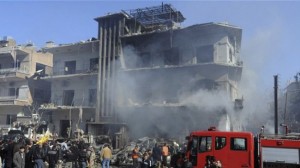 A senior MP today blamed Russia and China for the plight of almost two million Syrian refugees forced to flee their country’s civil war.
A senior MP today blamed Russia and China for the plight of almost two million Syrian refugees forced to flee their country’s civil war.
Richard Ottaway, chairman of the Commons foreign affairs committee, blasted Moscow and Beijing for blocking efforts to end the conflict. He said politicians in Iran and Iraq, and Hezbollah chiefs, also bore responsibility for the refugees’ suffering and for a crisis destabilising the region.
He spoke as the United Nations highlighted the shocking extent of the refugee problem: 600,000 Syrians have flooded into Lebanon and 400,000 into Turkey. Some 150,000 are squeezed into the Zaatari camp in Jordan. Huge numbers of civilians are internally displaced in Syria.
More than 100,000 have died in the civil war since March 2011. Mr Ottaway said: “If you can point the blame anywhere, point it at Moscow, Beijing, Tehran, Baghdad and Hezbollah HQ. They are blocking any serious attempt to resolve the situation, placing obstructions at the UN, and promising to match any support for rebels with support for the regime.”
UN officials now fear the flight from Syria may permanently alter neighbouring countries’ populations, in the same way the Palestinian crises of 1948 and 1967 did. So many have fled to Lebanon to escape the war, aid officials estimate that by the end of the year one in four people in the country will be a Syrian refugee.
Antonio Guterres, UN High Commissioner for Refugees, told the Guardian today that if the Syria crisis was not resolved soon, the UN would look to settle thousands of refugees in richer countries, including Britain. He said: “We are facing something that is more than a humanitarian crisis, more than a regional crisis — it is becoming a real threat to global peace and security.”
Mr Ottaway admitted that with the civil war in deadlock, the West may have to accept living with Presdent Bashar al-Assad in power as a likely outcome. He added that the pending Geneva 2 international conference would be critical to finding a political solution, and alleviating refugees’ suffering, though a date is yet to be set.
It follows the Geneva 1 conference last year, which was attended by the US, Russia, and European and Arab nations. “We must exhaust all diplomatic avenues and we haven’t done that yet,” said Mr Ottaway. “We have the G2 conference coming up, where hopefully the Russians and Americans will agree an agenda to bringing about a negotiated settlement.”
Yesterday France pushed for humanitarian corridors in Syria, a bid that is unlikely to win UN Security Council support but is aimed at pressuring Russia. In Paris, President François Hollande met a delegation of the opposition Syrian National Coalition (SNC) and said France was working on “corridors that will possibly be opened to give necessary aid to the population. It is presumed that such corridors would probably have to be guarded by international forces, and would require a Security Council resolution. Russia and China have already vetoed three resolutions aimed at pressuring Mr al-Assad.
The SNC was heading to New York, where Britain is organizing an informal meeting of the Security Council on tomorrow.
A Polish journalist was taken hostage by Islamist militants in Syria yesterday. Opposition activists said Marcin Suder was abducted in the rebel-held town of Saraqeb in Idlib province. The Syrian opposition is becoming increasingly split between moderate and Islamist groups. At least 39 journalists were killed and 21 kidnapped in Syria in 2012.
By Evening Standard
The Iran Project is not responsible for the content of quoted articles.

 QR code
QR code